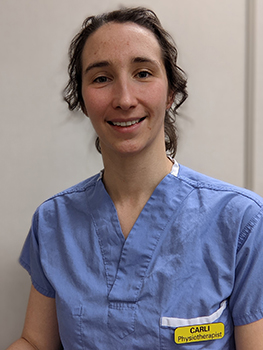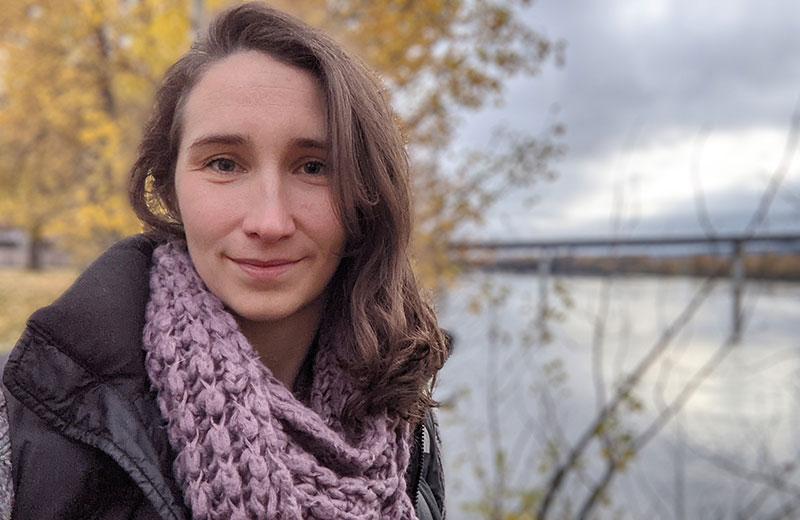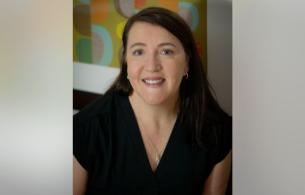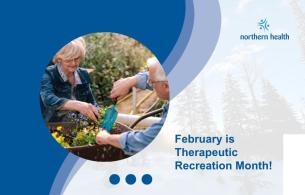May is National Physiotherapy Month in Canada. It’s an opportunity to recognize physiotherapists for their significant role in health promotion and the treatment of injury and disease. Physiotherapists combine their in-depth knowledge of the body and how it works with specialized hands-on clinical skills to assess, diagnose, and treat symptoms of illness, injury, or disability.
To celebrate, we’re sharing the stories of Northern Health physiotherapists. Carli Kerr describes her role as a physiotherapist at the University Hospital of Northern British Columbia (UHNBC) in Prince George. Carli became a physiotherapist after working as a lifeguard for more than 10 years. She says teaching people of all ages and abilities to swim and exercise in a safe and accessible way inspired her to pursue a career in physiotherapy.
Tell us about your role
“I work with neuro outpatients at UHNBC in Prince George. Most of my role is seeing outpatients in Prince George, but I’m available for the region, so I do virtual health as well. I do a mix of one-to-one sessions and group programs, hydrotherapy, and I lend a hand on the acute floors if I have capacity. There have also been students from UBC involved in the clinic, so mentorship is a big part of my role.”
What is the neuro outpatient program?
“I work with anything neurological: everything from stroke, multiple sclerosis, Parkinson's disease, traumatic brain injury, myelitis, and spinal cord injury… the population is really diverse.
We help people who have experienced a recent neurological incident causing functional changes. We serve patients who don’t quality for inpatient rehab like those who are discharged from hospital with minimal deficits. We also help people who have done a rehab stint, as they are often still in a time period where we would expect them to experience change. For example, the best time to create change, improve, and rehab a stroke patient is over the first 12 months. By the time they work their way through their hospital stay in rehab, it might only be three or four months post-stroke. The hope is to have accessible follow-up in a community setting where people can continue to rehab and improve over longer time periods to get back to their best baseline possible.”
What is it like to work with students?

“Recovery can be slow for the neuro population. There are patients that need a lot of follow-up long term, so to be able to give them that as one person is really challenging. There have been two students from UBC in the clinic every placement since August 2021, and depending on what level they’re at, they can increase my caseload. I can see around 20 patients a week on my own, whereas the students can see an additional 10 to 12 patients. We can offer more to our patients, to allow people to be seen multiple times a week and for longer timeframes. The patients have seemed to really enjoy it, the students have gotten really good feedback, and most of the patients are really sad when the students are done after their five-week stint with us! The students get a lot out of it too, because it's an opportunity for them to be hands-on.”
What impact does your role have on patients?
“A lot of patients, especially the ones that have a long stay in the hospital, come in with severe limitations and often don't realize how difficult it's going to be to go back home. I think it can be kind of scary for people going from having many health care professionals here supporting you to going home and not knowing what's next and not being where you were before you had your incident. The biggest impact for the patients is just knowing that there's going to be somebody to follow up with, there's going to be somebody that they can reach out to and ask questions, and there's going to be somebody checking in on them, so when they get home and it's harder than they expected, they know they're not alone.”
What’s something thing you wish everyone knew about physiotherapy?
“The most important thing is that physio is not just about what you do in the clinic with your physiotherapist, it's about what you're willing to put in on your own time that makes the biggest difference. You may be here in the hospital doing your ankle pumps or your breathing exercises in bed, or if you're an outpatient, you’re doing those exercises at home. We only get a little snippet of time with you, whether it's 20 minutes or an hour, and then you go on and you spend the other 23 and a half hours of your day alone. It really comes down to individual motivation and what you're willing to put in outside of the clinic session that is going to make the difference that people often want to see!”














Comments